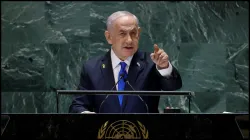Netanyahu assures US that Israel would not strike Iran's nuclear or oil facilities: Report
Netanyahu's unusually moderate stand has signalled that Israel wants to conduct a limited counterstrike to avoid a full-scale war. US President Joe Biden has publicly voiced his opposition to an Israeli attack on Iran's nuclear facilities.

Tel Aviv: While Israel is weighing an expected retaliation against Iran for its missile attack on October 1, Israeli Prime Minister Benjamin Netanyahu has assured the Biden administration that it would only strike Tehran's military and not its nuclear and oil facilities, two officials familiar with the matter told The Washington Post.
This assurance has signalled that Israel wants to proceed with a more limited counterstrike aimed at preventing a full-scale war, which the region had been bracing for after Iran's second direct missile attack on Israel in six months. It comes at a politically fraught time for the United States, which is gearing up for much-anticipated presidential elections that would see former President Donald Trump facing Vice President Kamala Harris.
The United States has been privately urging Israel to calibrate its response to avoid triggering a broader war in the Middle East, officials say, with US President Joe Biden publicly voicing his opposition to an Israeli attack on Iran's nuclear sites and his concerns about a strike on Iran's energy infrastructure. Biden and Netanyahu spoke to last week in their first conversation after seven weeks amid rising tensions between the two leaders.
What did Netanyahu tell the US?
During the call, Netanyahu said he was planning to target military infrastructure in Iran, according to a US official and another official familiar with the matter. The Israeli PM's office said “we listen to the opinions of the United States, but we will make our final decisions based on our national interest.”
The retaliatory action would be calibrated to avoid the perception of "political interference in the US elections", said one of the official, which signalled Netanyahu’s understanding that the scope of the Israeli strike has the potential to reshape the presidential race. A direct attack on Iran's oil facilities could have multiple repercussions, including soaring energy prices, according to analysts.
On the other hand, an attack on Iran's nuclear facilities could erase any remaining red lines governing Israel’s conflict with Tehran, triggering further escalation and risking a more direct US military role. In lieu of these possibilities, Netanyahu's plan to go after Iranian military sites was met with relief from Washington.
Netanyahu was in a “more moderated place” in that discussion than he had previously been, said the official. The apparent softening of the prime minister’s stance factored into Biden’s decision to send a powerful missile defense system to Israel, both officials said.
When would Israel strike Iran?
The United States on Sunday said it will send US troops and an advanced THAAD anti-missile system to Israel, in a highly unusual deployment meant to bolster the country's air defenses following missile attacks by Iran. US President Joe Biden said the move was meant "to defend Israel," after Iran fired close to 200 missiles on October 1.
"At the direction of the President, Secretary Austin authorised the deployment of a Terminal High-Altitude Area Defense (THAAD) battery and associated crew of US military personnel to Israel to help bolster Israel's air defences following Iran's unprecedented attacks against Israel on April 13 and again on October 1," said the Pentagon on Sunday (local time) in a statement.
The US official familiar with the matter said the Israeli strike would be carried out before the US elections on November 5 as a lack of action could be interpreted by Iran as a sign of weakness. “It will be one in a series of responses,” she said.
Iran warns of harsher response
Iran's Foreign Minister Abbas Araghchi warned earlier on Sunday that the United States was putting the lives of its troops "at risk" by deploying them to operate US missile systems in Israel. "While we have made tremendous efforts in recent days to contain an all-out war in our region, I say it clearly that we have no red lines in defending our people and interests," Araghchi posted on X.
Still, experts say Iran has sought to avoid a direct war with the United States, making deployment of US forces to Israel another factor in its calculus going forward. Zohar Palti, a former intelligence director for Israel’s Mossad intelligence agency, said Netanyahu would need to balance Washington’s appeals for moderation with the public demand in Israel for an overwhelming response. “When we responded last time, they didn’t get the message,” Palti said. “So the alternative now is between restraint or retaliation, and the answer is obvious.”
Israel is currently fighting on multiple fronts - primarily Hezbollah in Lebanon and Hamas in Gaza. Israel expanded its targets in its war with Hezbollah militants in Lebanon on Monday, killing at least 21 people in an airstrike in the north, health officials said, while millions of Israelis took shelter from projectiles fired back across the border.
The Israeli military said about 115 projectiles fired by Hezbollah crossed from Lebanon into Israel on Monday. Israeli military operations in northern Gaza have also increased, with Israeli forces killing at least 10 people while they were queuing for food in Jabalia, according to Palestinians medics.
(with agency input)
ALSO READ | What is THAAD, the advanced US anti-missile system being provided to Israel? EXPLAINED